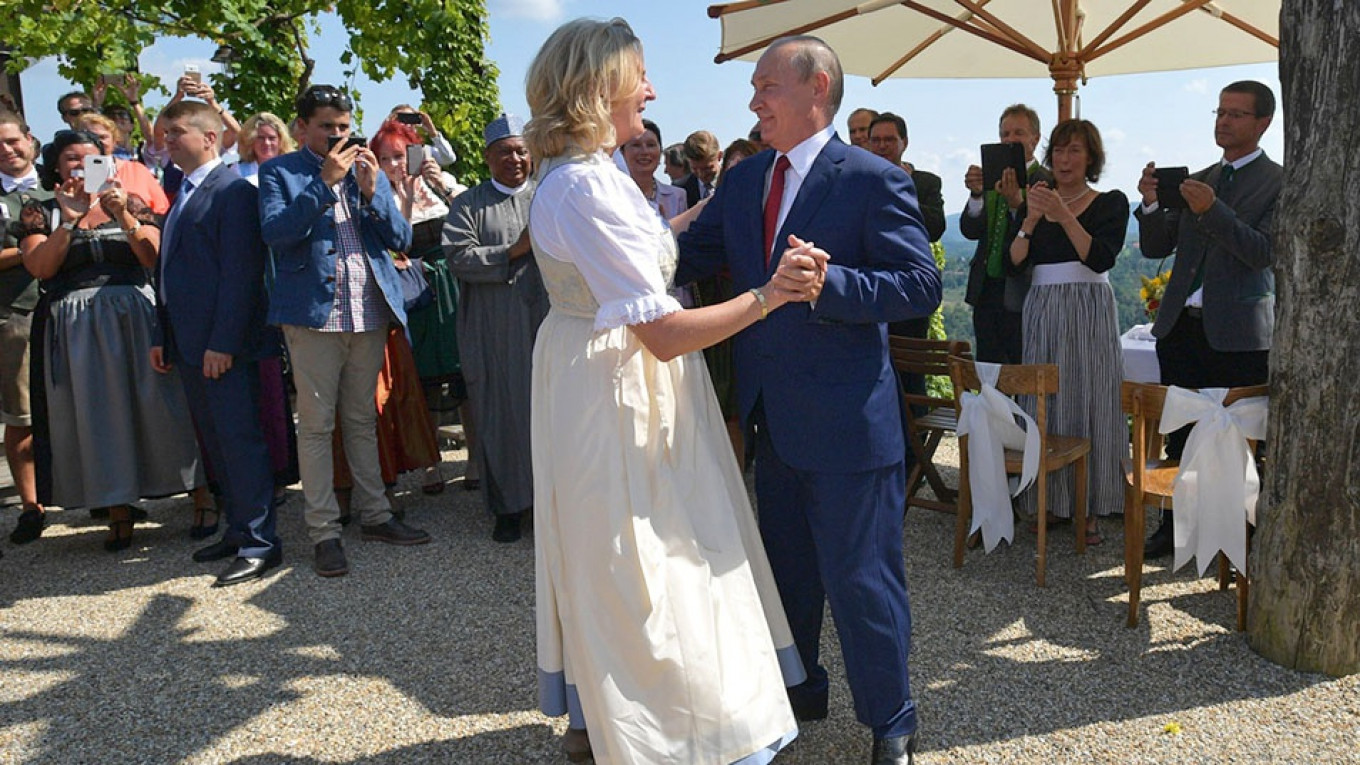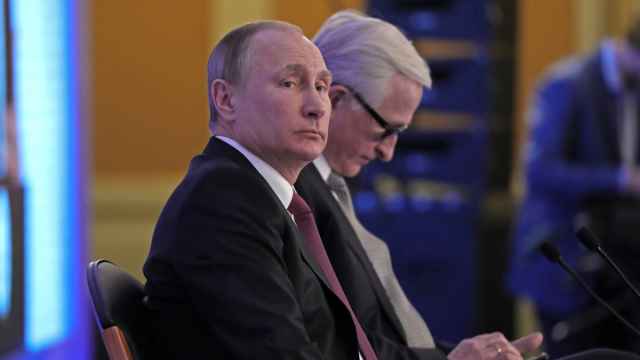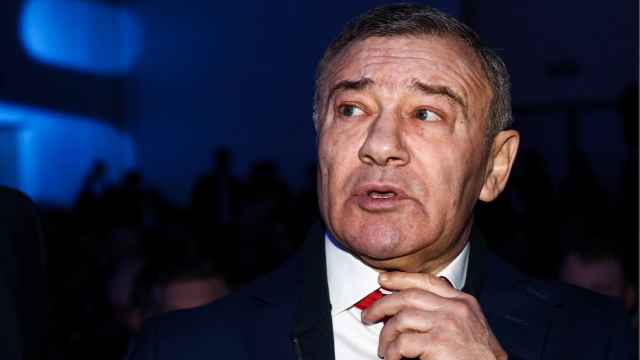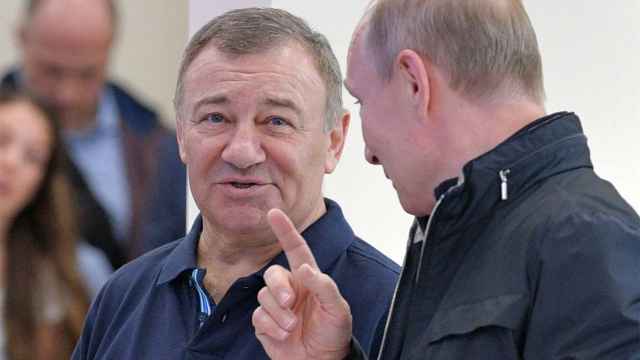Scenes of Vladimir Putin dancing with Austrian Foreign Minister Karin Kneissl at her wedding last weekend caused a big stir, primarily because both the invitation and the president’s attendance undermine Europe’s staunch policy towards Russia. But what has been overlooked in this furor is the bride herself.
Karin Kneissl, 54, is a Middle East expert and speaks seven foreign languages, according to Putin’s wedding toast. What her career has lacked in color, her unsettling worldview has certainly made up for in flamboyance.
I worked briefly with Kneissl in 2006, in the aftermath of a conference with female foreign ministers from various eastern European and African countries, which I had organized in my role as a PR representative in government development attached to the Austrian Foreign Ministry.
Then a freelance journalist, Kneissl took on the monumental task of transcribing and summarizing hours of speeches and panel discussions to produce the basis of a conference report. (As a young academic and desperate to expand my list of publications, I gratefully included the final report, edited by me and my colleagues, on my CV.)
Years later, I was reminded of Kneissl when controversy erupted over her 2012 book “Testosterone Makes Politics.” High testosterone levels were to blame for the Arab Spring, the 1848 uprisings in Europe and movements like Occupy Wall Street, she wrote. Later in her book, the dangers of concentrated testosterone levels were extended to refugees entering Austria. (It was at this point that I silently deleted the editors’ names from her conference report.)
These controversial statements brought Kneissl into the heart of Austria’s far right.
In one of her next books, published in 2017, she applied her biological analysis to China. Central here were the consequences of the country’s one-child policy: Surplus testosterone-filled Chinese men are exported to Africa to work in mines and oil fields. A male overkill in these areas led to a rise of rape cases, she wrote, referring to one conversation with someone but not citing any other source.
Kneissl also warned of the potential consequences should China put these men, pumped up with testosterone, to war.
Despite the Kremlin’s occasional schmoozing with far right groups, in a state as multi-ethnic as Russia such quasi-racist reductions would not go down well.
Explaining many other social norms as biologically-given is, however, perfectly legitimate in Russia. Since Soviet times, there has been a staunch belief that everyone and everything should assume a place allocated to it by “nature,” affecting views on family, gender roles and motherhood.
Many of the 80 multi-millionaires and billionaires I interviewed for my book “Rich Russians: From Oligarchs to Bourgeoisie” attributed their fortunes to their biological superiority. “Listen, I got genes from my parents,” one billionaire’s wife, Yekaterina, said. “Of course, these genes allowed me to develop myself and all the qualities that led to success.”
She continued: “I don’t have any noble roots. My parents are relatively simple people. All they achieved, they achieved because of their own capabilities. They possessed natural and biological resources which they managed to make the most of. They had a thirst for education, culture and a certain lifestyle, both of them. And I inherited it. That’s actually really wonderful.”
Western attitudes towards a biological reading of the world — and the social norms dictating what one is allowed to say about such things in public — were largely transformed by World War II.
With Germany atoning for putting racial theories into genocidal practice, Western critical thinkers, especially up-and-coming feminists, questioned whether the hierarchies imposed on them derived from nature and biology or whether they were simply man-made.
Meanwhile, in the Soviet Union, conservative-biological interpretations of history and human behavior rose to the fore. This was reinforced by the fact that the social sciences, which tend to foster critical thinking, were underdeveloped and marginalized.
That a large part of today’s Russian elite was born during that time goes a long way in explaining its adherence to (often bluntly self-elevating) biological views and its openness in expressing them. In private, Western elites might not reason all that differently, but they have long learned not to crudely express such thoughts.
There is something gauche in these rich Russians’ clumsy arrogance; they might just not know any better. There is, however, little to forgive in Kneissl, who knows exactly what she is doing and is perfectly aware of how eerily close her views creep to Nazi ideology.
As such, it wasn’t entirely clear at last Saturday’s wedding party who was dancing with the devil. Perhaps Kneissl’s next book will deal with the biological explanations of Russian geopolitics and character.
Dr. Elisabeth Schimpfössl is lecturer in sociology at Aston University. Her new book “Rich Russians: From Oligarchs to Bourgeoisie” is published by Oxford University Press. The views and opinions expressed in opinion pieces do not necessarily reflect the position of The Moscow Times.
A Message from The Moscow Times:
Dear readers,
We are facing unprecedented challenges. Russia's Prosecutor General's Office has designated The Moscow Times as an "undesirable" organization, criminalizing our work and putting our staff at risk of prosecution. This follows our earlier unjust labeling as a "foreign agent."
These actions are direct attempts to silence independent journalism in Russia. The authorities claim our work "discredits the decisions of the Russian leadership." We see things differently: we strive to provide accurate, unbiased reporting on Russia.
We, the journalists of The Moscow Times, refuse to be silenced. But to continue our work, we need your help.
Your support, no matter how small, makes a world of difference. If you can, please support us monthly starting from just $2. It's quick to set up, and every contribution makes a significant impact.
By supporting The Moscow Times, you're defending open, independent journalism in the face of repression. Thank you for standing with us.
Remind me later.






